Here comes another blow for the world’s most indebted property developer — Evergrande Group. A court in Hong Kong has ordered the liquidation of battered Chinese property giant Evergrande, that has become the symbol of a property crisis in the Asian country. Justice Linda Chan delivered the
ruling
on Monday morning, saying “it is time for the court to say enough is enough”. “(Given) the obvious lack of the progress on the part of the company in putting forward a viable restructuring proposal and the insolvency of the company… I consider that it is appropriate for the court to make a winding up order against the company and I so order,” judge Linda Chan said. The ruling against the Shenzhen-based developer comes as it has gained notoriety for being the most indebted property developer, with total liabilities of over $328 billion (Rs 27 lakh crore) at the end of June last year. This caps a new low for the Chinese company after it defaulted in 2021. Here’s a rise and fall of the Chinese property giant. Humble beginnings Evergrande sprung from the mind of Xu Jiayin. As per Nikkei Asia, Xu, hailed from a poor family in Henan Province. His father was a World War II veteran and his mother died soon after giving birth to him. Brought up by his grandmother, Xu recalled in a 2017 speech how he ate only sweet potato and steamed bread in his school years. “The sheets I laid, the quilts I covered, and the clothes I wore were all covered with piles of patches,” said Xu, also known as Hui Ka Yan in Cantonese. “At that time, my greatest wish was to go out of the countryside, find a job and be able to eat better food.” After leaving school in 1976 — the end of the decade-long Cultural Revolution — he struggled to find work. As colleges reopened, Xu studied metallurgy and was later assigned to a state-run steel factory. He left in 1992 for Shenzhen, the buzzing heart of China’s reform and opening-up experiment in the 1990s, before founding Evergrande in 1996. [caption id=“attachment_13664732” align=“alignnone” width=“640”]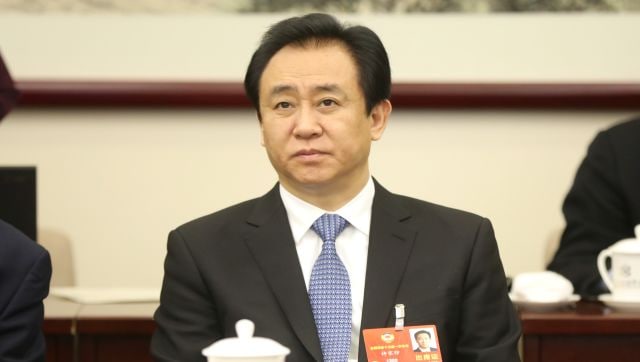 Evergrande Group Chairman Xu Jiayin. File image/Reuters[/caption] As per Nikkei Asia, the firm initially had a staff of just eight. China at the time was rapidly urbanising and Xu used the country’s ‘reform policies’ to his advantage. Xu’s first project was a 110,000-sq-metre site in Guangzhou – which he called Jinbi Garden. It took Xu a year to finish the project – by which time the financial crisis had come and gone though he survived unscathed. The project brought Xu a lot of money – and was the start of it all for Evergrande, according to the newspaper. Rapid expansion By 2009, Evergrande debuted on the Hong Kong Stock Exchange. As per The Guardian, the firm raised $9 billion through its IPO. Evergrande’s business model was unique at the time; it borrowed large sums of money and then sold apartments that hadn’t even been built yet. According to its own website, the group’s real estate unit has more than 1,300 projects across 280 cities in China. It also started expanding beyond real estate. Evergrande took control of Chinese Super League club Guangzhou, renaming it Guangzhou Evergrande. The company also moved into the dairy, grain and oil businesses and later tried to build an electric car. [caption id=“attachment_13664742” align=“alignnone” width=“640”]
Evergrande Group Chairman Xu Jiayin. File image/Reuters[/caption] As per Nikkei Asia, the firm initially had a staff of just eight. China at the time was rapidly urbanising and Xu used the country’s ‘reform policies’ to his advantage. Xu’s first project was a 110,000-sq-metre site in Guangzhou – which he called Jinbi Garden. It took Xu a year to finish the project – by which time the financial crisis had come and gone though he survived unscathed. The project brought Xu a lot of money – and was the start of it all for Evergrande, according to the newspaper. Rapid expansion By 2009, Evergrande debuted on the Hong Kong Stock Exchange. As per The Guardian, the firm raised $9 billion through its IPO. Evergrande’s business model was unique at the time; it borrowed large sums of money and then sold apartments that hadn’t even been built yet. According to its own website, the group’s real estate unit has more than 1,300 projects across 280 cities in China. It also started expanding beyond real estate. Evergrande took control of Chinese Super League club Guangzhou, renaming it Guangzhou Evergrande. The company also moved into the dairy, grain and oil businesses and later tried to build an electric car. [caption id=“attachment_13664742” align=“alignnone” width=“640”]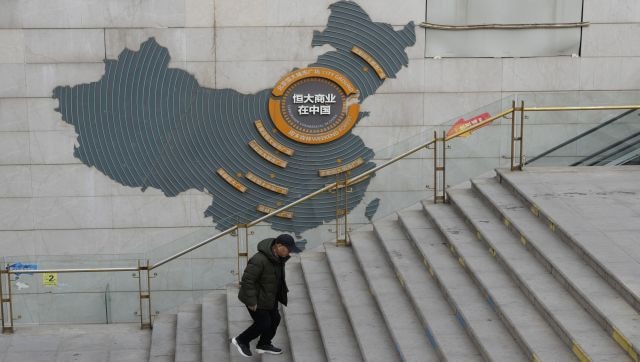 A man walks past a depiction of Evergrande properties across a China map at a partially shuttered Evergrande commercial complex in Beijing. AP[/caption] In 2013, Evergrande established an endowment at Harvard University. It also bought a 160-passenger private jet at a cost exceeding $45 million. By 2017, Xu could do no wrong. Evergrande’s share price had vaulted his net worth to an estimated $43 billion. Xu was the richest man in Asia. However, storm clouds were looming in the horizon. Trouble’s brewing In November 2018, came the first signs of trouble for Evergrande and Xu. It was then that China’s central bank added Evergrande to its list of highly indebted conglomerates to watch, and warned that a potential collapse could cause systemic risks. Two years later, more trouble came knocking at Evergrande’s door. Regulators in the country announced caps for three different debt ratios in a scheme dubbed “three red lines” that tightened lending to the real estate sector. Reacting to this situation, Evergrande sold 28 per cent of its property management unit for $3 billion and began to offload properties at significantly low rates. In the following year, 2021, regulators, as part of a crackdown on the property sector, began tightening scrutiny on the controversial practice of taking deposits from homeowners before a house is complete. This came as a huge blow to Evergrande, as this was widely practised norm by the property firm. [caption id=“attachment_13664762” align=“alignnone” width=“640”]
A man walks past a depiction of Evergrande properties across a China map at a partially shuttered Evergrande commercial complex in Beijing. AP[/caption] In 2013, Evergrande established an endowment at Harvard University. It also bought a 160-passenger private jet at a cost exceeding $45 million. By 2017, Xu could do no wrong. Evergrande’s share price had vaulted his net worth to an estimated $43 billion. Xu was the richest man in Asia. However, storm clouds were looming in the horizon. Trouble’s brewing In November 2018, came the first signs of trouble for Evergrande and Xu. It was then that China’s central bank added Evergrande to its list of highly indebted conglomerates to watch, and warned that a potential collapse could cause systemic risks. Two years later, more trouble came knocking at Evergrande’s door. Regulators in the country announced caps for three different debt ratios in a scheme dubbed “three red lines” that tightened lending to the real estate sector. Reacting to this situation, Evergrande sold 28 per cent of its property management unit for $3 billion and began to offload properties at significantly low rates. In the following year, 2021, regulators, as part of a crackdown on the property sector, began tightening scrutiny on the controversial practice of taking deposits from homeowners before a house is complete. This came as a huge blow to Evergrande, as this was widely practised norm by the property firm. [caption id=“attachment_13664762” align=“alignnone” width=“640”]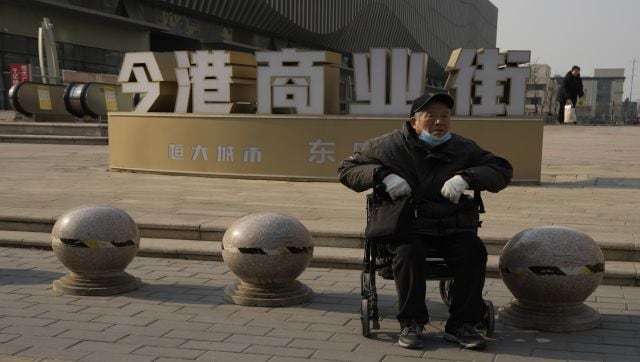 An elderly man sits in a wheelchair near a partially shuttered Evergrande commercial complex in Beijing. Trouble began for the Chinese property behemoth back in November 2018. AP[/caption] Big problems for Evergrande The first of the big blows to Evergrande came in August 2021 when an advertiser sued the firm for unpaid dues. This was followed up by several subcontractors, who complained of the same problem — unpaid dues. This led to work at several construction sites to be halted. Global ratings agencies such as Fitch, Moody’s, and S&P downgraded Evergrande’s outlook to negative, making it harder for the troubled firm to borrow money and raising fears of a possible bankruptcy. In a stock market filing, the firm stated that its liabilities were a whopping 1.97 trillion yuan ($305 billion) and that it is facing the “risks of defaults on borrowings”. In the following month of the same year, Evergrande said it was under “tremendous pressure” and may not be able to meet its liabilities. This led to many of the company’s customers to protest outside the firm’s headquarters in Shenzhen and other locations, demanding repayments.
An elderly man sits in a wheelchair near a partially shuttered Evergrande commercial complex in Beijing. Trouble began for the Chinese property behemoth back in November 2018. AP[/caption] Big problems for Evergrande The first of the big blows to Evergrande came in August 2021 when an advertiser sued the firm for unpaid dues. This was followed up by several subcontractors, who complained of the same problem — unpaid dues. This led to work at several construction sites to be halted. Global ratings agencies such as Fitch, Moody’s, and S&P downgraded Evergrande’s outlook to negative, making it harder for the troubled firm to borrow money and raising fears of a possible bankruptcy. In a stock market filing, the firm stated that its liabilities were a whopping 1.97 trillion yuan ($305 billion) and that it is facing the “risks of defaults on borrowings”. In the following month of the same year, Evergrande said it was under “tremendous pressure” and may not be able to meet its liabilities. This led to many of the company’s customers to protest outside the firm’s headquarters in Shenzhen and other locations, demanding repayments.
In December 2021, Evergrande defaulted on its debt. The Fitch Ratings agency cited the crisis-hit developer’s failure to make repayments of more than $1.2 billion. And the worst was yet to come. In August 2023, Evergrande filed for bankruptcy in the US, to protect its United States assets as it attempted to restructure its finances. [caption id=“attachment_13664782” align=“alignnone” width=“640”]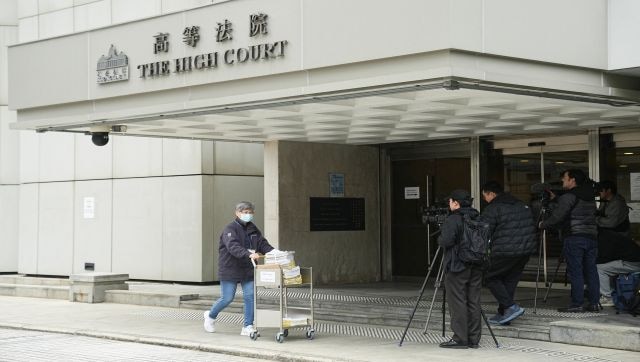 A person pushes a cart near media members standing outside the High Court where a court hearing on property developer China Evergrande Group is held, in Hong Kong. Reuters[/caption] The latest blow to Evergrande Based on a petition filed by creditor, Top Shine Global, a Hong Kong court has ordered the liquidation of the Chinese company. Shortly after the decision was declared, Evergrande’s Hong Kong-traded shares plunged nearly 21 per cent early Monday before they were suspended from trading. With this decision, the companies’ directors will cease to have control. Derek Lai, global insolvency leader at professional services firm Deloitte, told the BBC that a provisional liquidator would be appointed.
Also read: Hong Kong court orders liquidation of China’s Evergrande. What comes next?
However, there’s a problem. Most of Evergrande’s assets are in mainland China and despite the “one country, two systems” slogan, there are thorny jurisdictional issues. Shane Oliver, chief strategist at financial services firm AMP, said Monday’s landmark decision was “another step” in the ongoing
property crisis
in China. In an AFP report, he was quoted as saying, “It hasn’t created the major calamity that many feared. But by the same token, it hasn’t been resolved either.”’ “On the one hand, the authorities will probably manage this liquidation in a way that doesn’t cause major contagion effects to other parts of the economy,” he said. But “it tells us that the property crisis is still far from being resolved, and remains an ongoing drag on the Chinese economy,” Oliver said. Raymond Cheng at CGS-CIMB Securities was also quoted in the same report as saying, “The liquidation order will be negative for Evergrande itself for sure, the assigned liquidator will offload the company assets as soon as possible, and the price may be very bad.” Meanwhile, Evergrande CEO Shawn Siu told Chinese news outlet 21Jingji that the company feels “utmost regret” at the liquidation order. He emphasised that the order affects only the Hong Kong-listed China Evergrande unit. With inputs from agencies
A person pushes a cart near media members standing outside the High Court where a court hearing on property developer China Evergrande Group is held, in Hong Kong. Reuters[/caption] The latest blow to Evergrande Based on a petition filed by creditor, Top Shine Global, a Hong Kong court has ordered the liquidation of the Chinese company. Shortly after the decision was declared, Evergrande’s Hong Kong-traded shares plunged nearly 21 per cent early Monday before they were suspended from trading. With this decision, the companies’ directors will cease to have control. Derek Lai, global insolvency leader at professional services firm Deloitte, told the BBC that a provisional liquidator would be appointed.
Also read: Hong Kong court orders liquidation of China’s Evergrande. What comes next?
However, there’s a problem. Most of Evergrande’s assets are in mainland China and despite the “one country, two systems” slogan, there are thorny jurisdictional issues. Shane Oliver, chief strategist at financial services firm AMP, said Monday’s landmark decision was “another step” in the ongoing
property crisis
in China. In an AFP report, he was quoted as saying, “It hasn’t created the major calamity that many feared. But by the same token, it hasn’t been resolved either.”’ “On the one hand, the authorities will probably manage this liquidation in a way that doesn’t cause major contagion effects to other parts of the economy,” he said. But “it tells us that the property crisis is still far from being resolved, and remains an ongoing drag on the Chinese economy,” Oliver said. Raymond Cheng at CGS-CIMB Securities was also quoted in the same report as saying, “The liquidation order will be negative for Evergrande itself for sure, the assigned liquidator will offload the company assets as soon as possible, and the price may be very bad.” Meanwhile, Evergrande CEO Shawn Siu told Chinese news outlet 21Jingji that the company feels “utmost regret” at the liquidation order. He emphasised that the order affects only the Hong Kong-listed China Evergrande unit. With inputs from agencies
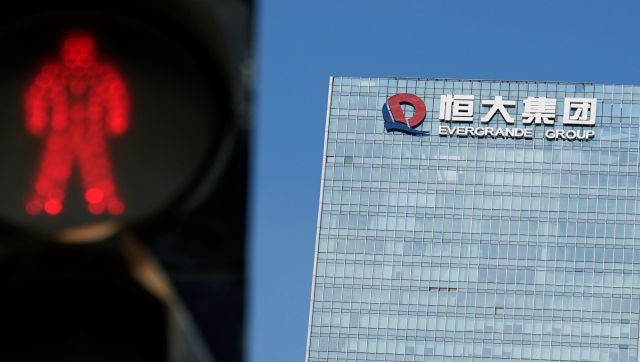)